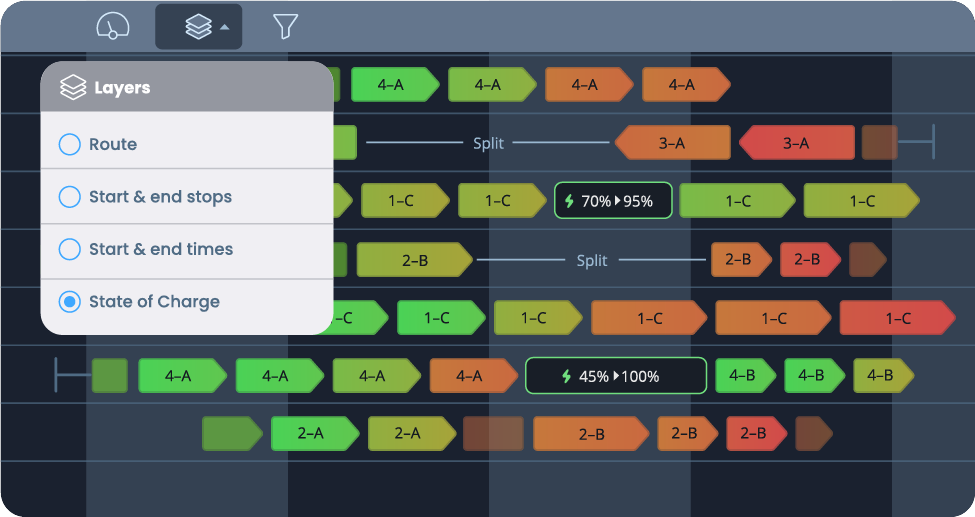Overview
The electrification of buses in the UK has gained significant momentum, underlining the national commitment to sustainable and clean urban transportation. However, this transition introduces challenges that governments, cities, local authorities, operators, and technology providers must tackle together.
Using Optibus’ Planning and Scheduling software, Stagecoach East has introduced 30 new electric buses to a new, fully electric Park and Ride network in Cambridge, UK. The move builds on Optibus and Stagecoach East’s ongoing collaboration since July 2022 and marks a significant step towards overcoming electrification challenges associated with infrastructure in historic cities with growing populations and the ambitious environmental targets set by municipalities to create a zero emission future.
Project background
Cambridge is growing rapidly. The local population increased by 17.6% in the ten year period between 2011 and 2021 to 150,000 residents, and 8.1 million tourists visit the town annually.
In light of these trends, Cambridge sees sustainable mobility as a key element in achieving their goal of shifting to 100% renewable energy by 2035 and going zero emission by 2050. The creation of a Net Zero Transportation Plan is underway and five Park and Ride sites have been developed around Cambridge to reduce congestion and emissions.
The Park and Ride sites are open 24/7 and offer up to 18 hours of free parking, with buses departing up to every 10 minutes during peak times. Designed to be 100% electric and zero emission, the system features a new fleet of 30 electric buses jointly financed by Stagecoach East, the Greater Cambridge Partnership, the Cambridgeshire and Peterborough Combined Authority, and the Department for Transport after successfully bidding for the Zero Emission Bus Regional Areas (ZEBRA) scheme.
This new deployment raises the proportion of EVs in Stagecoach’s Cambridge fleet to about 33%.
Electrification Challenges: Space, Infrastructure, and Charging Schedules
Introducing electric buses to Stagecoach East’s fleet and Park and Ride system involved several challenges:
- Depot capacity: Electric vehicles and their charging infrastructure consume more space than diesel vehicles, leading to lower vehicle capacity at existing depots. Stagecoach’s existing depot could house 45 diesel buses, but only 30 electric vehicles.
- Limited energy infrastructure: Stagecoach’s depot had just 15 charging points – the maximum number of chargers the electric grid could support. This limited the ability to scale the electric fleet.
- Charging schedules: Charging requirements fundamentally changed Stagecoach’s scheduling process. All vehicle details needed to be collected from the manufacturers for Stagecoach to build their preferences and then optimize the schedules. The process of building preferences also became more time consuming with EVs.
- Engineer availability: To charge the electric buses, engineers need to be available onsite at the depot. Thus, there are specific time windows in which EVs can return to the depot and have someone available to charge them. Stagecoach needed to build blocks in the schedule around the availability of engineers.
Impact: Optimizing schedules to overcome resource constraints
Stagecoach East first began using Optibus’ software in July 2022. When they kicked off the initiative to convert Cambridge’s Park & Ride into a fully electric network, they used Optibus’ EV Management solution throughout the transition.

Stagecoach East used Optibus to create optimized schedules that maintain service quality despite a 33% decrease in fleet count due to limited vehicle capacity at the depot as a result of electrification. To ensure those EVs are properly charged, Stagecoach used Optibus’ software to reduce scheduling complexities and build blocks in the schedule to match the availability of on-site charging engineers.
Optibus’ software also offered a faster, easier way of building complex electric vehicle specs into scheduling preferences, and then optimizing service plans.
As the fleet grows, Rapid Scenario Creation will support the exploration of charging schedules that overcome the limited number of chargers.
Impact: 4,565 kg of CO2 eliminated every week
In line with Cambridge’s goal of going zero emission by 2050, Stagecoach East’s new electric bus fleet reduces about 4,565 kg of CO2 from the operation each work week. Additionally, the successful roll-out of these EVs has cut costs, as the regenerative braking systems of electric buses involve lower maintenance costs.
The project also aligns with the vision of Stagecoach at large, which has set a target of becoming completely carbon neutral by 2050.
Want to learn more about how Optibus can support you in the transition to operating electric buses? Book a consultation here.
Further Reading:
- 25M passenger trips annually
- Introduced 30 new EVs
- 800 employees
- Eliminating approximately 4,565 kg of CO2 per work week
- Maintained service quality despite 33% decrease in fleet count
- Products: Planning, Scheduling, Rostering, EV